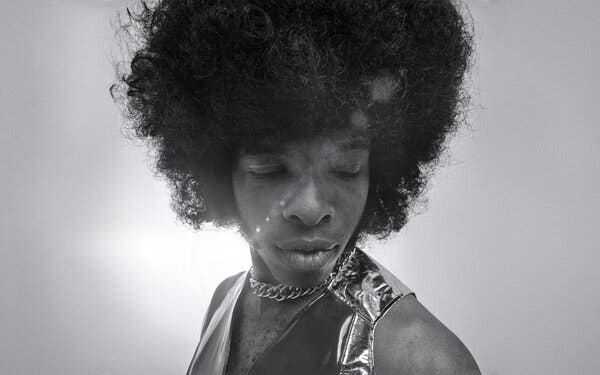Sly Stone's Genius Was and Still Is Liberating
My only weapon is my pen. And the state of mind I'm in.
What's the true merit of genius these days? Is it telling that that's even a question? (Something feels fleeting or ephemeral about genius.) If you're so smart, why can't you manage to stick around? If you're a Black genius—isn't that a (disheartening) minority within a minority? Enter Sly Lives! (aka the Burden of Black Genius), Questlove's inventive new Sly Stone documentary. If the film doesn't exactly answer these questions, it showcases a conflicted musical legend whose largesse still engages us.
When Maria Shriver says to Sly (in footage from her 1982 interview, which introduces the documentary), "You were at that place that every musician wants to be. You get there, and you blow it," I couldn't stop thinking about Lauryn Hill. First of all, that's a "gotcha" statement. And Lauryn didn't "blow it," but much like Sly, she was on top of the world and then—static. Maybe that's what comes with being a truth-bringer—can truth and craftsmanship endure the dreaded cost-benefit analysis? Sly cracked the code earlier in his career when he and the progressive, unisex, interracial Family Stone made art that appealed to everybody until the drugs and partying turned him into a skeptical hermit. The Black Panthers began pressuring Sly to cater his songs to the cause. CBS demanded yet another disc full of even more upbeat, jingoistic hits when intergroup riffs forecast an eventual breakup (akin to the Fugees' smooth split in 1997). Woodstock (where Sly and company closed out the '60s with the inspirational "I Want to Take You Higher"), in some ways like Lauryn's fervent 1999 Grammy acceptance speech, represented the tipping point—the creative Kilimanjaro, where idealism meets flagrant commercialism for a limited time only, apparently. (Could they take us any higher?) Sly seems sedate in the film as he ponders Shriver's take: ". . . You get there, and you blow it." And we're, frankly, elated to re-experience Sly's journey.
I love how the picture reminds you that despite Sly's "combative" aura, he's essentially a peace-and-love dude. "Black, white, girls, and boys" was the Family Stone ethos when Stokely Carmichael prescribed "Black power." "I was a white guy trying to be Black, and he was a Black man being everything," says Jerry Martini, saxophonist and Family Stone co-founder, in a lovable origin-story montage. Sharp footage highlights Sly's budding, interracial high school band, whose United Colors of Benetton flavor made think about how Sly’s nascent songs (as Sylvester Stewart) have the melodic Brill Building tint found on the Family Stone's greatest records. I immediately thought of Lou Reed, who, like Sly, started big and bright (penning ear-pleasing ditties), then went sneakish and wry in his career-defining staples. But a mottled sense of bliss impels nearly every one of Sly's tunes. "Family Affair" is a black canticle about interfamilial angst but sounds AM-radio cheery. Differing from James Brown's 1968 anthem, "Say It Loud, I'm Black and I'm Proud," Sly's most trenchant ode, 1969's "Don't Call Me Nigger, Whitey," is latently conciliatory, denoting that the whites and Blacks "talkin' funky to each other" couldn't change a thing. I love Stand!’s unifying protest and venerate There’s a Riot Goin’ On’s evasive self-cancellations. Uncompromising artistry is Sly’s great gift, even as it led to his retreat from the stage. Still, his genius lasts forever.





Very cool essay. I must say one thing though--Lauryn gifted us with one great album, but Sly had at least ten if you count the post-Riot joints, which many folks don't. I love me some Vernon Reid, but when he said Riot was the last great album I just thought about how much I loved Fresh and Small Talk. The "Black genius" catagory, as we've seen with D'Angelo (3 albums in 30 years), is a slippery slope. I encourge you to buy "Sly & the Family Stone: An Oral History "by Joel Selvin for a deeper look behind the music and mayham.